Unit 7 Memory 第3课时Grammar导学案
文档属性
| 名称 | Unit 7 Memory 第3课时Grammar导学案 |
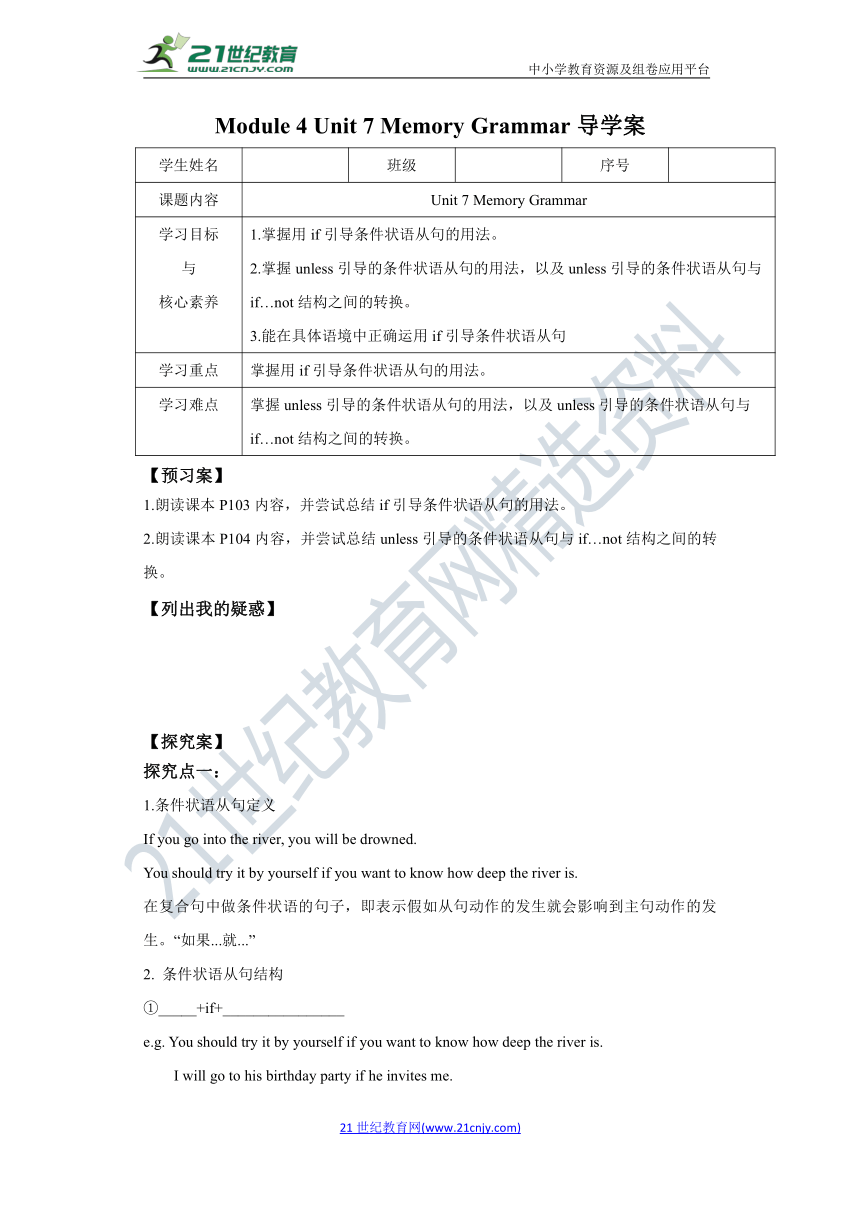
|
|
| 格式 | doc | ||
| 文件大小 | 2.4MB | ||
| 资源类型 | 试卷 | ||
| 版本资源 | 牛津深圳版 | ||
| 科目 | 英语 | ||
| 更新时间 | 2020-12-15 00:00:00 | ||
图片预览

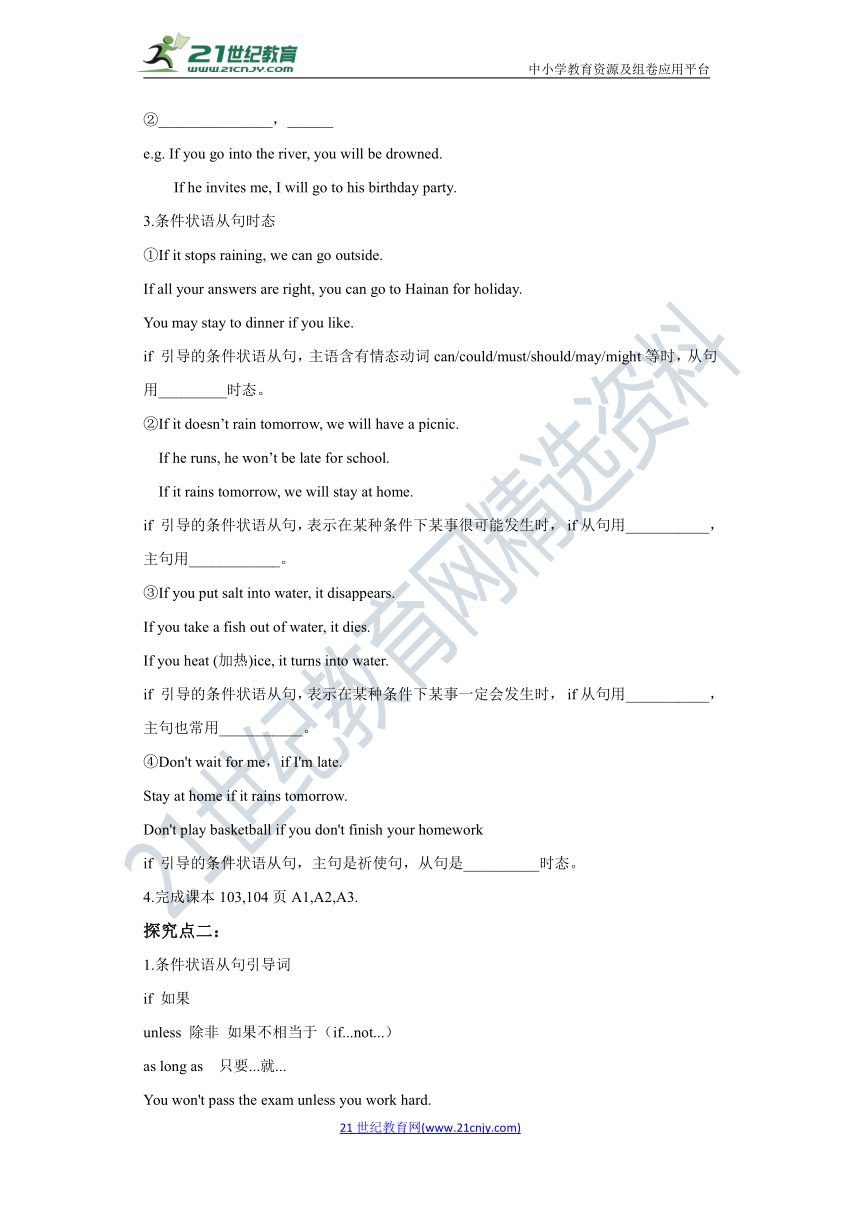
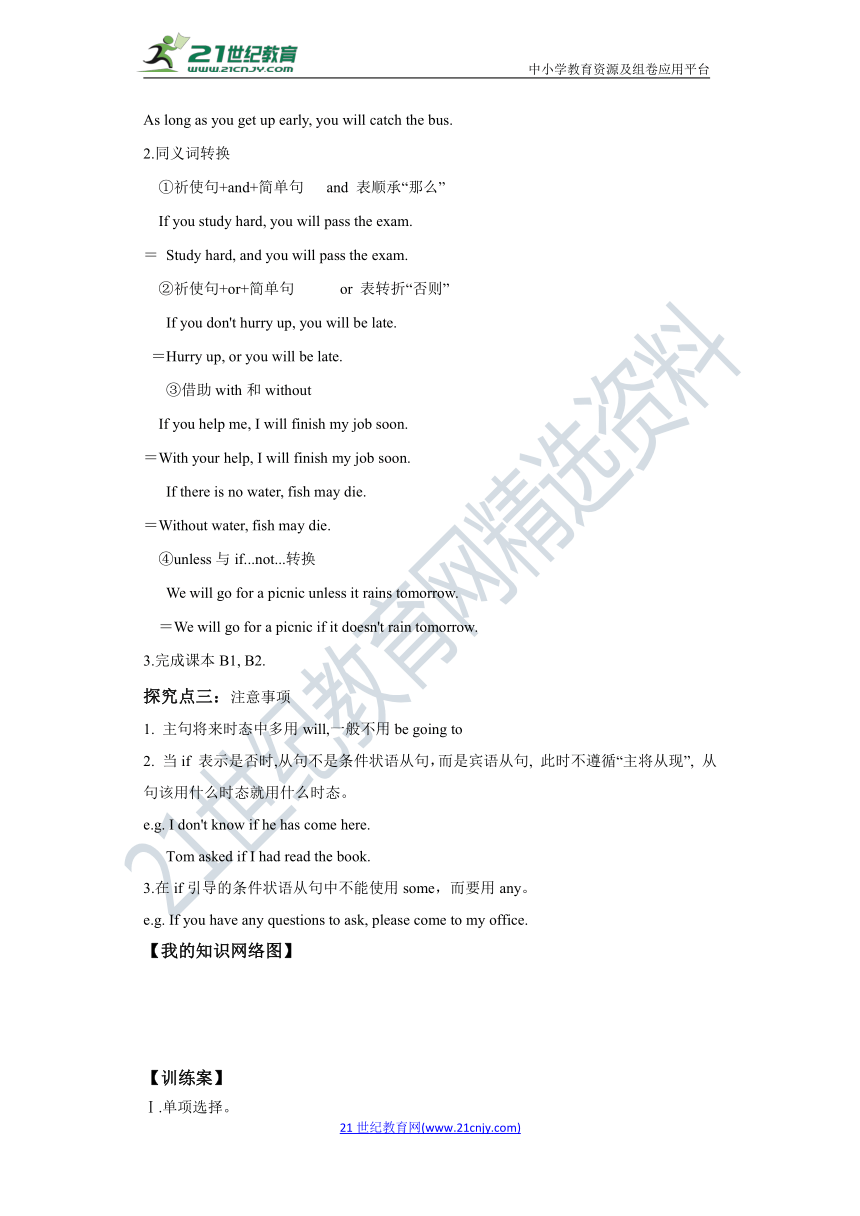
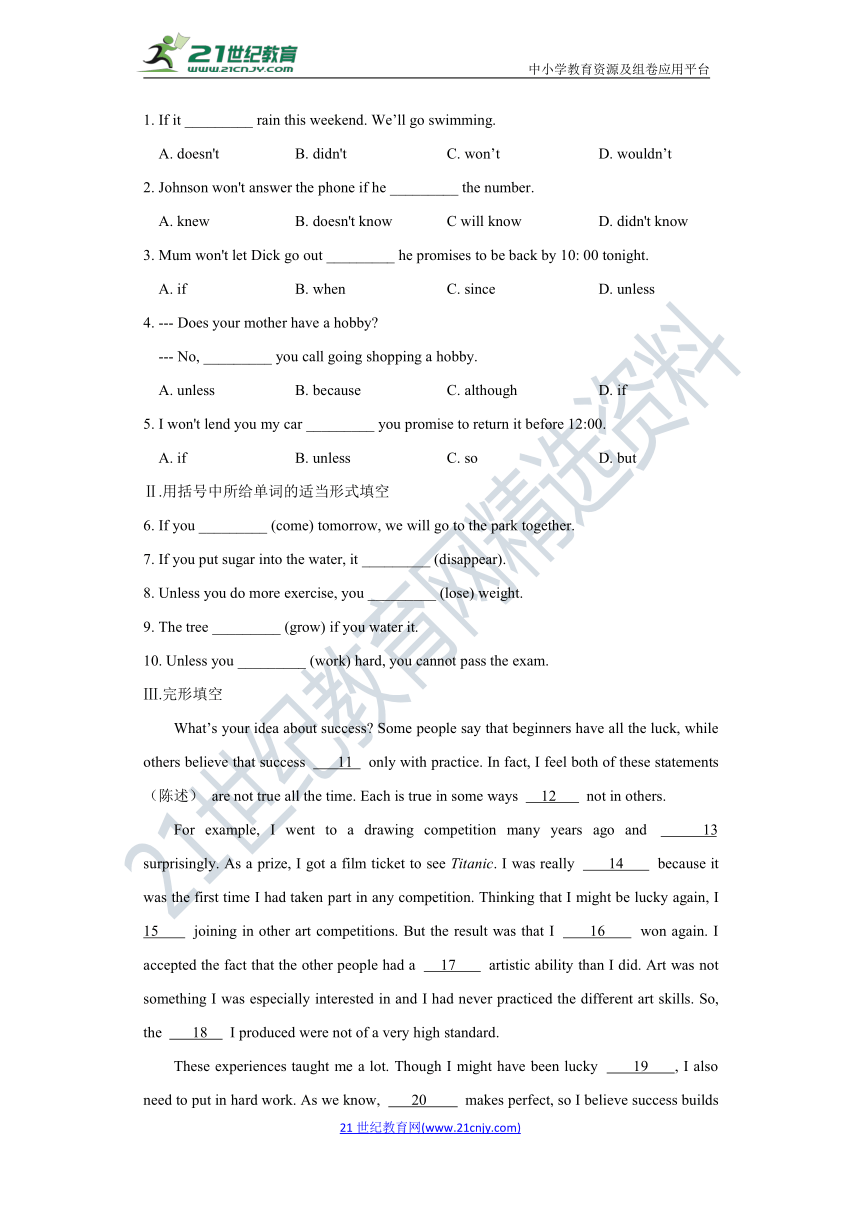
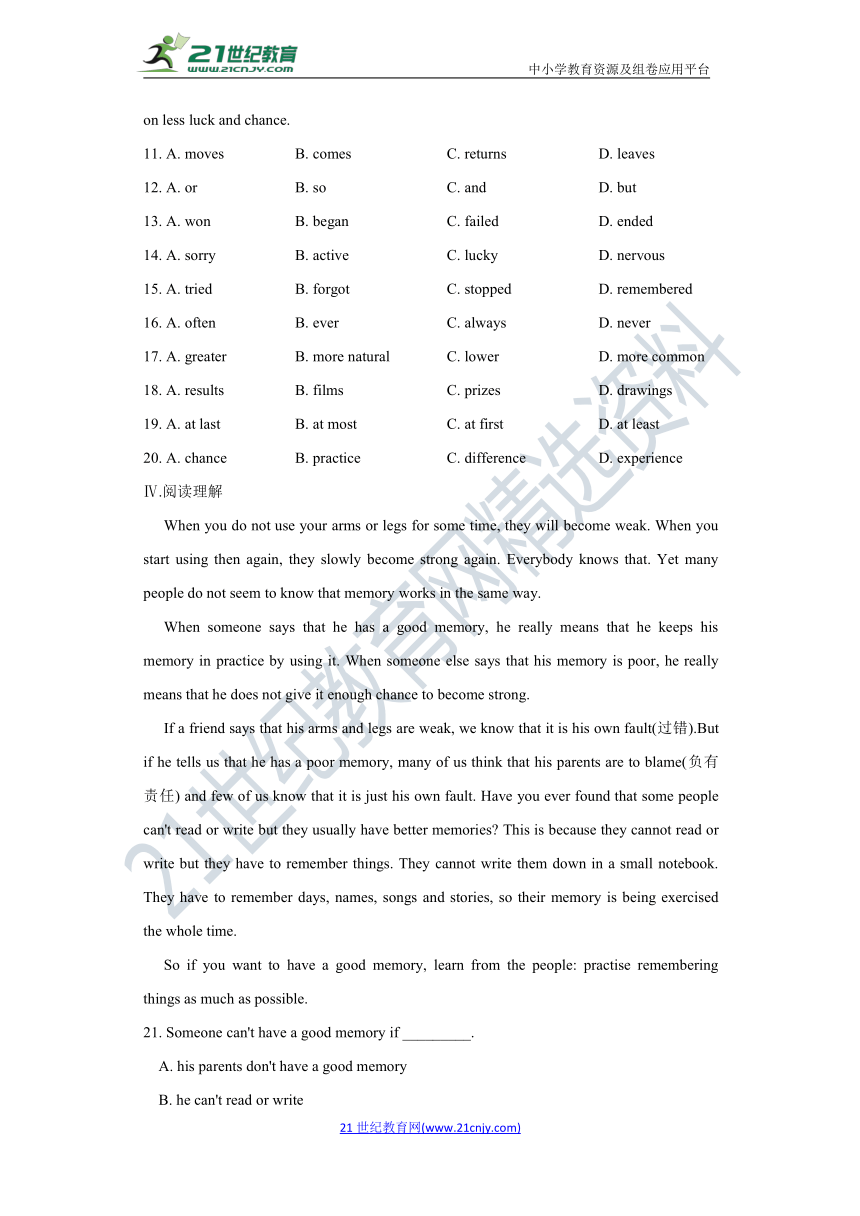
文档简介
中小学教育资源及组卷应用平台
Module 4 Unit 7 Memory Grammar导学案
学生姓名
班级
序号
课题内容 Unit 7 Memory Grammar
学习目标 与
核心素养 1.掌握用if引导条件状语从句的用法。
2.掌握unless引导的条件状语从句的用法,以及unless引导的条件状语从句与if…not结构之间的转换。
3.能在具体语境中正确运用if引导条件状语从句
学习重点 掌握用if引导条件状语从句的用法。
学习难点 掌握unless引导的条件状语从句的用法,以及unless引导的条件状语从句与if…not结构之间的转换。
【预习案】
1.朗读课本P103内容,并尝试总结if引导条件状语从句的用法。
2.朗读课本P104内容,并尝试总结unless引导的条件状语从句与if…not结构之间的转换。
【列出我的疑惑】
【探究案】
探究点一:
1.条件状语从句定义
If you go into the river, you will be drowned.
You should try it by yourself if you want to know how deep the river is.
在复合句中做条件状语的句子,即表示假如从句动作的发生就会影响到主句动作的发生。“如果...就...”
2. 条件状语从句结构
①_____+if+________________
e.g. You should try it by yourself if you want to know how deep the river is.
I will go to his birthday party if he invites me.
②_______________,______
e.g. If you go into the river, you will be drowned.
If he invites me, I will go to his birthday party.
3.条件状语从句时态
①If it stops raining, we can go outside.
If all your answers are right, you can go to Hainan for holiday.
You may stay to dinner if you like.
if 引导的条件状语从句,主语含有情态动词can/could/must/should/may/might等时,从句用_________时态。
②If it doesn’t rain tomorrow, we will have a picnic.
If he runs, he won’t be late for school.
If it rains tomorrow, we will stay at home.
if 引导的条件状语从句,表示在某种条件下某事很可能发生时, if从句用___________,主句用____________。
③If you put salt into water, it disappears.
If you take a fish out of water, it dies.
If you heat (加热)ice, it turns into water.
if 引导的条件状语从句,表示在某种条件下某事一定会发生时, if从句用___________,主句也常用___________。
④Don't wait for me,if I'm late.
Stay at home if it rains tomorrow.
Don't play basketball if you don't finish your homework
if 引导的条件状语从句,主句是祈使句,从句是__________时态。
4.完成课本103,104页A1,A2,A3.
探究点二:
1.条件状语从句引导词
if 如果
unless 除非 如果不相当于(if...not...)
as long as 只要...就...
You won't pass the exam unless you work hard.
As long as you get up early, you will catch the bus.
2.同义词转换
①祈使句+and+简单句 and 表顺承“那么”
If you study hard, you will pass the exam.
= Study hard, and you will pass the exam.
②祈使句+or+简单句 or 表转折“否则”
If you don't hurry up, you will be late.
=Hurry up, or you will be late.
③借助with和without
If you help me, I will finish my job soon.
=With your help, I will finish my job soon.
If there is no water, fish may die.
=Without water, fish may die.
④unless与if...not...转换
We will go for a picnic unless it rains tomorrow.
=We will go for a picnic if it doesn't rain tomorrow.
3.完成课本B1, B2.
探究点三:注意事项
1. 主句将来时态中多用will,一般不用be going to
2. 当if 表示是否时,从句不是条件状语从句,而是宾语从句, 此时不遵循“主将从现”, 从句该用什么时态就用什么时态。
e.g. I don't know if he has come here.
Tom asked if I had read the book.
3.在if引导的条件状语从句中不能使用some,而要用any。
e.g. If you have any questions to ask, please come to my office.
【我的知识网络图】
【训练案】
Ⅰ.单项选择。
1. If it _________ rain this weekend. We’ll go swimming.
A. doesn't B. didn't C. won抰 D. wouldn抰
2. Johnson won't answer the phone if he _________ the number.
A. knew B. doesn't know C will know D. didn't know
3. Mum won't let Dick go out _________ he promises to be back by 10: 00 tonight.
A. if B. when C. since D. unless
4. --- Does your mother have a hobby?
--- No, _________ you call going shopping a hobby.
A. unless B. because C. although D. if
5. I won't lend you my car _________ you promise to return it before 12:00.
A. if B. unless C. so D. but
Ⅱ.用括号中所给单词的适当形式填空
6. If you _________ (come) tomorrow, we will go to the park together.
7. If you put sugar into the water, it _________ (disappear).
8. Unless you do more exercise, you _________ (lose) weight.
9. The tree _________ (grow) if you water it.
10. Unless you _________ (work) hard, you cannot pass the exam.
Ⅲ.完形填空
What’s your idea about success? Some people say that beginners have all the luck, while others believe that success 11 only with practice. In fact, I feel both of these statements (陈述) are not true all the time. Each is true in some ways 12 not in others.
For example, I went to a drawing competition many years ago and 13 surprisingly. As a prize, I got a film ticket to see Titanic. I was really 14 because it was the first time I had taken part in any competition. Thinking that I might be lucky again, I 15 joining in other art competitions. But the result was that I 16 won again. I accepted the fact that the other people had a 17 artistic ability than I did. Art was not something I was especially interested in and I had never practiced the different art skills. So, the 18 I produced were not of a very high standard.
These experiences taught me a lot. Though I might have been lucky 19 , I also need to put in hard work. As we know, 20 makes perfect, so I believe success builds on less luck and chance.
11. A. moves B. comes C. returns D. leaves
12. A. or B. so C. and D. but
13. A. won B. began C. failed D. ended
14. A. sorry B. active C. lucky D. nervous
15. A. tried B. forgot C. stopped D. remembered
16. A. often B. ever C. always D. never
17. A. greater B. more natural C. lower D. more common
18. A. results B. films C. prizes D. drawings
19. A. at last B. at most C. at first D. at least
20. A. chance B. practice C. difference D. experience
Ⅳ.阅读理解
When you do not use your arms or legs for some time, they will become weak. When you start using then again, they slowly become strong again. Everybody knows that. Yet many people do not seem to know that memory works in the same way.
When someone says that he has a good memory, he really means that he keeps his memory in practice by using it. When someone else says that his memory is poor, he really means that he does not give it enough chance to become strong.
If a friend says that his arms and legs are weak, we know that it is his own fault(过错).But if he tells us that he has a poor memory, many of us think that his parents are to blame(负有责任) and few of us know that it is just his own fault. Have you ever found that some people can't read or write but they usually have better memories? This is because they cannot read or write but they have to remember things. They cannot write them down in a small notebook. They have to remember days, names, songs and stories, so their memory is being exercised the whole time.
So if you want to have a good memory, learn from the people: practise remembering things as much as possible.
21. Someone can't have a good memory if _________.
A. his parents don't have a good memory
B. he can't read or write
C. he doesn't use his memory
D. he doesn't use his arms or legs for some time
22. If you do not use your arms or legs for some time, _________.
A. they will become weak and won't become strong until you use them again
B. they will become stronger
C. they will become weak but they will slowly become strong again
D. you can’t use them any more
23. Which of the following is TRUE?
A. Your memory works in the different way from your arms or legs.
B. Your memory, like your arms or legs, will become weak if you do not give it enough
chance to practice.
C. Don't learn how to read or write if you want to have a better memory.
D. A good memory comes from less practice.
24. Few people know that it is just _________ if a friend says he has a poor memory.
A. his grandmother’s fault B. his parents’ fault
C. his teachers’ fault D. his own fault
25. The writer wants to tell us _________.
A. how to have a good memory
B. how to read and write
C. how to use our arms or legs
D. how to learn from other people
【教与学的反思】
探究案答案:
探究点一:
2.
3.
4.A1
A3
探究点二:
3.B1
B2
训练案答案:
Ⅰ.1-5 ABDAB
Ⅱ. 6. come 7. disappears 8. will not lose 9. grows 10. work
Ⅲ. 11-15 BDACA 16-20 DADCB
Ⅳ. 21-25 CABDA
_21?????????è?????(www.21cnjy.com)_
Module 4 Unit 7 Memory Grammar导学案
学生姓名
班级
序号
课题内容 Unit 7 Memory Grammar
学习目标 与
核心素养 1.掌握用if引导条件状语从句的用法。
2.掌握unless引导的条件状语从句的用法,以及unless引导的条件状语从句与if…not结构之间的转换。
3.能在具体语境中正确运用if引导条件状语从句
学习重点 掌握用if引导条件状语从句的用法。
学习难点 掌握unless引导的条件状语从句的用法,以及unless引导的条件状语从句与if…not结构之间的转换。
【预习案】
1.朗读课本P103内容,并尝试总结if引导条件状语从句的用法。
2.朗读课本P104内容,并尝试总结unless引导的条件状语从句与if…not结构之间的转换。
【列出我的疑惑】
【探究案】
探究点一:
1.条件状语从句定义
If you go into the river, you will be drowned.
You should try it by yourself if you want to know how deep the river is.
在复合句中做条件状语的句子,即表示假如从句动作的发生就会影响到主句动作的发生。“如果...就...”
2. 条件状语从句结构
①_____+if+________________
e.g. You should try it by yourself if you want to know how deep the river is.
I will go to his birthday party if he invites me.
②_______________,______
e.g. If you go into the river, you will be drowned.
If he invites me, I will go to his birthday party.
3.条件状语从句时态
①If it stops raining, we can go outside.
If all your answers are right, you can go to Hainan for holiday.
You may stay to dinner if you like.
if 引导的条件状语从句,主语含有情态动词can/could/must/should/may/might等时,从句用_________时态。
②If it doesn’t rain tomorrow, we will have a picnic.
If he runs, he won’t be late for school.
If it rains tomorrow, we will stay at home.
if 引导的条件状语从句,表示在某种条件下某事很可能发生时, if从句用___________,主句用____________。
③If you put salt into water, it disappears.
If you take a fish out of water, it dies.
If you heat (加热)ice, it turns into water.
if 引导的条件状语从句,表示在某种条件下某事一定会发生时, if从句用___________,主句也常用___________。
④Don't wait for me,if I'm late.
Stay at home if it rains tomorrow.
Don't play basketball if you don't finish your homework
if 引导的条件状语从句,主句是祈使句,从句是__________时态。
4.完成课本103,104页A1,A2,A3.
探究点二:
1.条件状语从句引导词
if 如果
unless 除非 如果不相当于(if...not...)
as long as 只要...就...
You won't pass the exam unless you work hard.
As long as you get up early, you will catch the bus.
2.同义词转换
①祈使句+and+简单句 and 表顺承“那么”
If you study hard, you will pass the exam.
= Study hard, and you will pass the exam.
②祈使句+or+简单句 or 表转折“否则”
If you don't hurry up, you will be late.
=Hurry up, or you will be late.
③借助with和without
If you help me, I will finish my job soon.
=With your help, I will finish my job soon.
If there is no water, fish may die.
=Without water, fish may die.
④unless与if...not...转换
We will go for a picnic unless it rains tomorrow.
=We will go for a picnic if it doesn't rain tomorrow.
3.完成课本B1, B2.
探究点三:注意事项
1. 主句将来时态中多用will,一般不用be going to
2. 当if 表示是否时,从句不是条件状语从句,而是宾语从句, 此时不遵循“主将从现”, 从句该用什么时态就用什么时态。
e.g. I don't know if he has come here.
Tom asked if I had read the book.
3.在if引导的条件状语从句中不能使用some,而要用any。
e.g. If you have any questions to ask, please come to my office.
【我的知识网络图】
【训练案】
Ⅰ.单项选择。
1. If it _________ rain this weekend. We’ll go swimming.
A. doesn't B. didn't C. won抰 D. wouldn抰
2. Johnson won't answer the phone if he _________ the number.
A. knew B. doesn't know C will know D. didn't know
3. Mum won't let Dick go out _________ he promises to be back by 10: 00 tonight.
A. if B. when C. since D. unless
4. --- Does your mother have a hobby?
--- No, _________ you call going shopping a hobby.
A. unless B. because C. although D. if
5. I won't lend you my car _________ you promise to return it before 12:00.
A. if B. unless C. so D. but
Ⅱ.用括号中所给单词的适当形式填空
6. If you _________ (come) tomorrow, we will go to the park together.
7. If you put sugar into the water, it _________ (disappear).
8. Unless you do more exercise, you _________ (lose) weight.
9. The tree _________ (grow) if you water it.
10. Unless you _________ (work) hard, you cannot pass the exam.
Ⅲ.完形填空
What’s your idea about success? Some people say that beginners have all the luck, while others believe that success 11 only with practice. In fact, I feel both of these statements (陈述) are not true all the time. Each is true in some ways 12 not in others.
For example, I went to a drawing competition many years ago and 13 surprisingly. As a prize, I got a film ticket to see Titanic. I was really 14 because it was the first time I had taken part in any competition. Thinking that I might be lucky again, I 15 joining in other art competitions. But the result was that I 16 won again. I accepted the fact that the other people had a 17 artistic ability than I did. Art was not something I was especially interested in and I had never practiced the different art skills. So, the 18 I produced were not of a very high standard.
These experiences taught me a lot. Though I might have been lucky 19 , I also need to put in hard work. As we know, 20 makes perfect, so I believe success builds on less luck and chance.
11. A. moves B. comes C. returns D. leaves
12. A. or B. so C. and D. but
13. A. won B. began C. failed D. ended
14. A. sorry B. active C. lucky D. nervous
15. A. tried B. forgot C. stopped D. remembered
16. A. often B. ever C. always D. never
17. A. greater B. more natural C. lower D. more common
18. A. results B. films C. prizes D. drawings
19. A. at last B. at most C. at first D. at least
20. A. chance B. practice C. difference D. experience
Ⅳ.阅读理解
When you do not use your arms or legs for some time, they will become weak. When you start using then again, they slowly become strong again. Everybody knows that. Yet many people do not seem to know that memory works in the same way.
When someone says that he has a good memory, he really means that he keeps his memory in practice by using it. When someone else says that his memory is poor, he really means that he does not give it enough chance to become strong.
If a friend says that his arms and legs are weak, we know that it is his own fault(过错).But if he tells us that he has a poor memory, many of us think that his parents are to blame(负有责任) and few of us know that it is just his own fault. Have you ever found that some people can't read or write but they usually have better memories? This is because they cannot read or write but they have to remember things. They cannot write them down in a small notebook. They have to remember days, names, songs and stories, so their memory is being exercised the whole time.
So if you want to have a good memory, learn from the people: practise remembering things as much as possible.
21. Someone can't have a good memory if _________.
A. his parents don't have a good memory
B. he can't read or write
C. he doesn't use his memory
D. he doesn't use his arms or legs for some time
22. If you do not use your arms or legs for some time, _________.
A. they will become weak and won't become strong until you use them again
B. they will become stronger
C. they will become weak but they will slowly become strong again
D. you can’t use them any more
23. Which of the following is TRUE?
A. Your memory works in the different way from your arms or legs.
B. Your memory, like your arms or legs, will become weak if you do not give it enough
chance to practice.
C. Don't learn how to read or write if you want to have a better memory.
D. A good memory comes from less practice.
24. Few people know that it is just _________ if a friend says he has a poor memory.
A. his grandmother’s fault B. his parents’ fault
C. his teachers’ fault D. his own fault
25. The writer wants to tell us _________.
A. how to have a good memory
B. how to read and write
C. how to use our arms or legs
D. how to learn from other people
【教与学的反思】
探究案答案:
探究点一:
2.
3.
4.A1
A3
探究点二:
3.B1
B2
训练案答案:
Ⅰ.1-5 ABDAB
Ⅱ. 6. come 7. disappears 8. will not lose 9. grows 10. work
Ⅲ. 11-15 BDACA 16-20 DADCB
Ⅳ. 21-25 CABDA
_21?????????è?????(www.21cnjy.com)_
